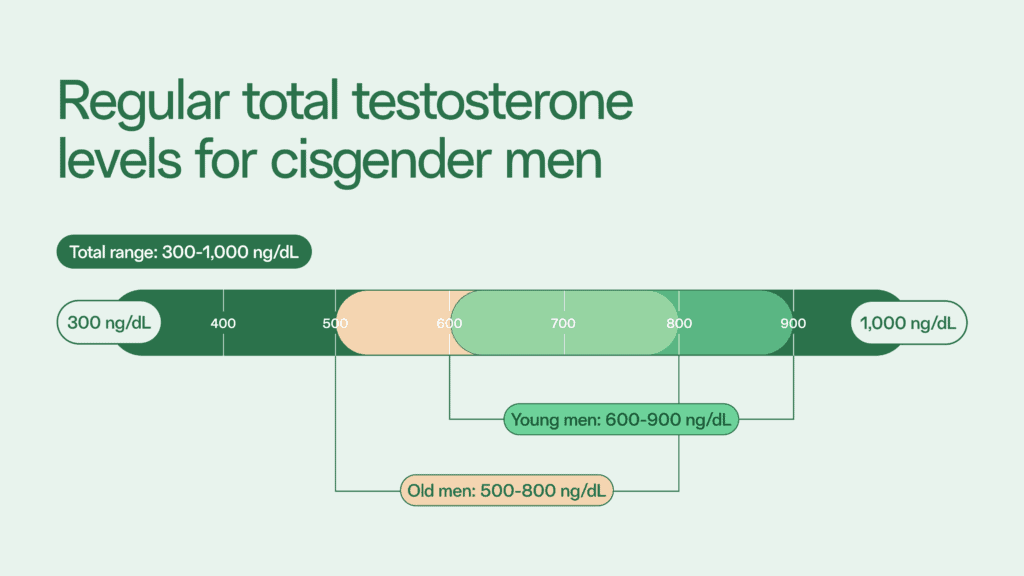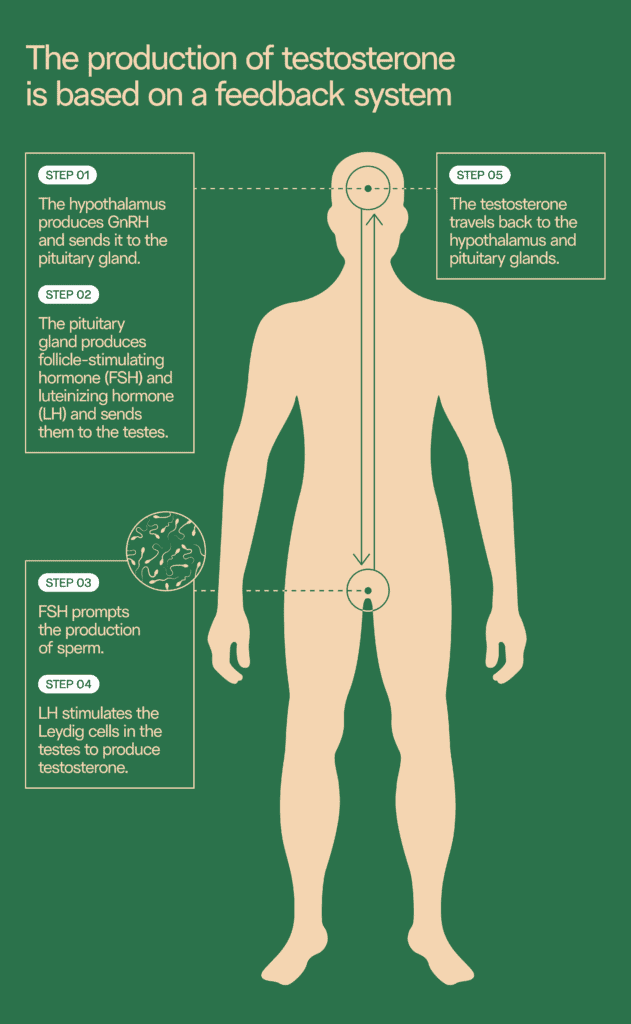Low testosterone can harm sperm production and make it difficult to conceive, in addition to affecting other important body systems, including male fertility. We cover testosterone’s role in male fertility and the body, how low testosterone is detected, treatment options for low testosterone, and what to do if you have low testosterone and are trying to conceive.
Key takeaways
- Low testosterone may impact sperm production and male fertility. A semen analysis can help you understand whether low testosterone is affecting your sperm count.
- Some treatments for low testosterone can further impact male fertility, so it’s important not to use them if you’re trying to conceive.
- Certain lifestyle changes and medications can help increase testosterone without affecting male fertility.
In the article below, we’ll be reviewing the role of testosterone and normal parameters for cisgender (assigned-male-at-birth) men. If you’re a trans man or a trans woman, normal testosterone levels may look different for you.
What is testosterone?
Testosterone is a sex hormone that plays an important role in many areas of the body, including male fertility. For males, these include:
- Male fertility and spermatogenesis (sperm production)
- Sex drive
- “Male” characteristics, like muscle growth and facial hair
- Puberty and sexual development, like the descent of the testicles
- Body fat levels and muscle mass
- Bone density
- Mood
What is low testosterone?
Typically, cisgender men have total testosterone levels between 300 ng/dL and 1,000 ng/dL, though this varies with age. Younger men will generally have a higher level, around 600–900 ng/dL, while older men will often be measured around 500–800 ng/dL.

Low testosterone may affect around 39% of men aged 45 years and above. The medical term for low testosterone or “low T” is male hypogonadism.
There are two types of hypogonadism:
- Primary hypogonadism, which results from an issue with the testicles
- Secondary hypogonadism, which is caused by a problem with the hypothalamus or pituitary gland in your brain.
Depending on the cause of the low testosterone levels, it’s possible to have just one type of hypogonadism or both at once.
Low testosterone symptoms
Sometimes, you may have no low testosterone symptoms. In other cases, low testosterone symptoms may include:
- low libido (sex drive)
- low sperm count
- erectile dysfunction
- smaller testicle size
- lower muscle mass
- reduced bone mass
- higher body fat levels
- trouble sleeping
- concentration difficulties
Since many of these symptoms occur in other conditions, it can sometimes take time to receive appropriate treatment for low testosterone.
Hormone testing to diagnose low testosterone
A blood test can measure your testosterone level and determine whether it’s normal or low, specifically below 300 ng/dL. In order to be diagnosed with low testosterone and hypogonadism, a patient would typically have low morning testosterone levels on several occasions, along with other symptoms such as weight gain or infertility.
Measuring other hormone levels can indicate whether you have primary or secondary hypogonadism.
- Low testosterone levels alongside high levels of luteinizing hormone (LH) and follicle stimulating hormone (FSH) suggest a problem with the testicles, indicating primary hypogonadism.
- Low testosterone levels with low or normal levels of LH and FSH identify the condition as secondary hypogonadism. This means the problem is in the areas of your brain that direct the testicles to produce testosterone.
Potential causes of low testosterone
Factors including genetics, medical conditions, and lifestyle can contribute to low testosterone levels and hypogonadism. Potential causes include:
- Aging, particularly after age 30 when testosterone levels begin to fall by around 1% each year
- Stress
- Obesity
- Kallmann syndrome, which can affect the development of the hypothalamus and lead to low testosterone
- Klinefelter syndrome, which causes abnormal testicular development
- Undescended testicle(s) or varicocele(s)
- Illness such as tuberculosis, liver failure, or HIV/AIDs
- Treatments and medications such as chemotherapy
Low testosterone and male fertility
Testosterone plays an essential role in male fertility, and small amounts of testosterone are required for sperm production and maturation. Therefore, very low testosterone levels may impact male fertility. Low testosterone may also reduce sex drive and cause erectile dysfunction, which can also make it difficult to conceive.

Studies show that around 15% of people with male-factor infertility have low levels of testosterone in their blood. It’s entirely possible, and in fact common, for men with low testosterone to have normal fertility, and for men with infertility to have normal testosterone levels.
Treatment options for low testosterone
If you have low testosterone caused by a medical condition, treatment may vary depending on the condition. Treatments for low testosterone may include methods to restore your testosterone to normal levels. However, it’s important to note that while some of these treatments are appropriate for those who are trying to conceive, others will negatively affect male fertility and should be avoided.
Testosterone replacement therapy
Testosterone replacement therapy, also known as TRT or supplemental testosterone, uses testosterone injections, patches, gels, or other administration methods to increase the level of testosterone in your blood.
TRT can significantly improve some symptoms of low testosterone, such as increasing your sex drive and reducing body fat levels. However, it doesn’t actually help your body produce more testosterone, and in fact can disrupt the balance of hormones that lead to testosterone production and sperm production, negatively affecting male fertility.
The normal flow of hormones in the male hypothalamus-pituitary-gonadal system looks something like this:
- The hypothalamus (in the brain) produces GnRH and sends it to the pituitary gland.
- Prompted by GnRH, the pituitary gland makes follicle-stimulating hormone (FSH) and luteinizing hormone (LH) and send them to the testes.
- FSH prompts the production of sperm, while LH stimulates the Leydig cells in the testes to produce testosterone.
- The testosterone produced in the testes travels back to the hypothalamus and pituitary glands, giving them feedback on the entire process.
Adding external testosterone to the blood tells the pituitary and hypothalamus glands that T levels are high enough. Therefore, these glands stop producing as much FSH and LH, which in turn lowers the level of testosterone produced in the testes and harms sperm production and male fertility.
In fact, testosterone can be considered a male contraceptive because of its ability to cause azoospermia, the condition of having no sperm in the semen. While sperm production may go back to normal around one year after stopping using testosterone, it’s important not to use TRT if you’re trying to conceive within the next 6–12 months.
Testosterone alongside human chorionic gonadotropin (hCG)
You may be able to use TRT and preserve your fertility if you take human chorionic gonadotropin (hCG) alongside the testosterone. While TRT reduces levels of LH, affecting sperm production, hCG mimics the effects of LH and helps reduce the impact of TRT on your fertility.
hCG can also help recover fertility following testosterone therapy. Research suggests that, for men with very low sperm counts following TRT treatment, taking 3,000IU of hCG every other day improved sperm counts in 95.9% of subjects.
Clomid (clomiphene citrate)
Like hCG, clomiphene citrate may help address low testosterone while preserving male fertility. Clomiphene citrate, brand name Clomid, increases levels of FSH and LH in the system, ramping up the natural production of testosterone without disrupting the balance of hormones.
One study found that men with hypogonadism who took 25mg of clomiphene citrate daily had increased average testosterone levels. People with hypogonadism may be able to take clomiphene citrate instead of testosterone to relieve their symptoms.
Furthermore, other research indicates that taking clomiphene citrate may increase sperm concentration and motility, though more studies are needed on its impact on male fertility.
Lifestyle changes to increase testosterone
Certain lifestyle factors may help increase testosterone and improve sperm health. You can try to:
- Reach and maintain a healthy weight (though this is likely more difficult for those already dealing with low testosterone).
- Exercise regularly — research indicates that aerobic exercise was associated with increased blood testosterone levels in overweight and obese men.
- Get sufficient sleep.
- Avoid smoking and other tobacco products, and limit your alcohol intake.
- Eat a healthy diet.
- Reduce your stress levels.
- Take supplements that may support healthy hormone levels, such as selenium, D-aspartic acid, zinc, ashwagandha, or fenugreek.
What to do if you have low testosterone and you’re trying to conceive
While low testosterone can impair sperm production and lower your sperm count, it may still be possible to conceive if you have low testosterone. If you’ve tried for several months without success, though, it may be worth talking to your doctor or a fertility specialist. They can look for issues contributing to infertility, conduct sperm testing for male fertility, and suggest treatments to help restore your testosterone levels without affecting your ability to conceive.
Sperm analysis to understand if low T is affecting fertility
You can check whether low testosterone is affecting your sperm with a semen analysis. You may be wondering: Where can I find sperm testing near me? Legacy makes it easy with a convenient at-home semen analysis to help you assess the health and number of your sperm and identify issues that may be affecting your fertility.
You can also preserve your fertility before starting testosterone treatments by freezing your sperm with Legacy’s short-term, medium-term, and long-term analysis and cryostorage options.
Other frequently asked questions about low testosterone
Have another question about low testosterone, male fertility, and trying to conceive? Keep reading. If we haven’t answered your question, please reach out to us at clientservices@givelegacy.com.
Does low testosterone cause infertility? Does low testosterone mean a low sperm count?
Low testosterone can reduce sex drive and cause erectile dysfunction, making it more difficult to conceive. It may also result in a lower sperm count, since testosterone is necessary for sperm production. While these issues can reduce male fertility and make it hard to conceive a pregnancy, natural conception may still be possible depending on the person.
My husband takes testosterone. Can I still get pregnant?
As mentioned above, external testosterone impairs or even halts sperm production. Research indicates that 65% of men will experience azoospermia (no sperm in the semen) within four months of using testosterone. As a result, it may be possible to get pregnant, depending on when your partner started taking testosterone, but it may be more difficult.
Can low testosterone cause miscarriage?
Low testosterone may contribute to miscarriage, though the relationship isn’t well understood. One study found that testosterone levels were 15% lower in male partners of women with recurrent pregnancy loss. While more research needs to be done in this area, checking testosterone levels may be helpful in cases of repeated miscarriages. Learn more about how male fertility may contribute to miscarriage.



